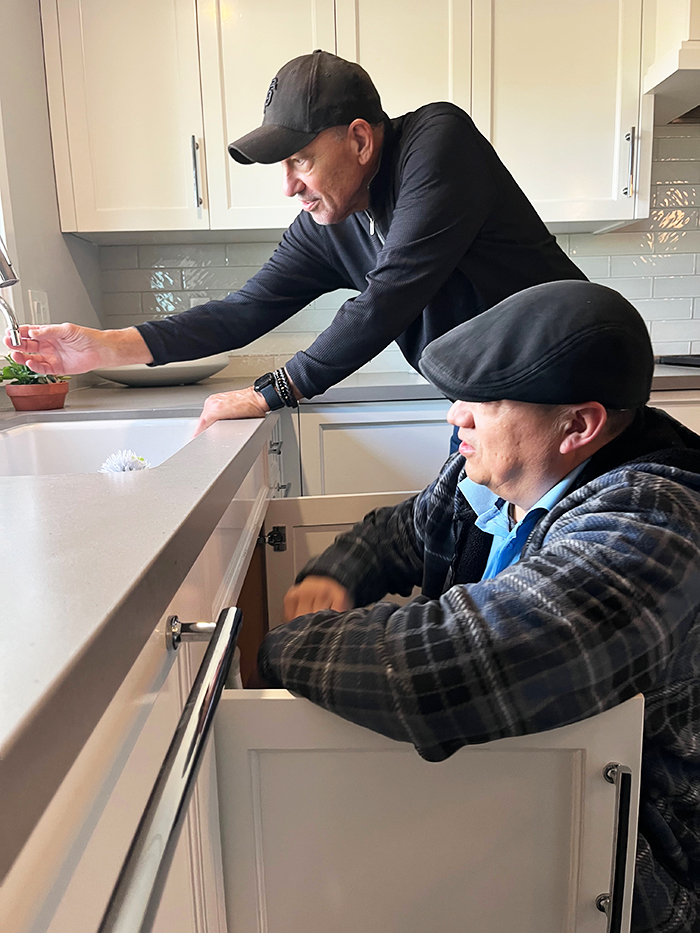SAN MATEO’S BEST
Plumbing services
RESPONSIVE
SKILLED
FRIENDLY
Need a plumber?
QUALITY & SERVICE SINCE 2002
The Peninsula’s Best Plumbers
 We are a local independent small business. We pride ourselves on delivering quality work and treating all our customers like VIPs. From water heaters to garbage disposals, clogged drains and anything in between, there is no problem too big or too small for us to handle.
We are a local independent small business. We pride ourselves on delivering quality work and treating all our customers like VIPs. From water heaters to garbage disposals, clogged drains and anything in between, there is no problem too big or too small for us to handle.
Our skilled plumbing contractors use the latest technologies—like snake drains and video camera inspections and apply industry-leading techniques to ensure your plumbing problems are dealt with in a timely and cost-effective manner. When you give us a call, we arrive promptly in fully stocked trucks ready to work.
• We are punctual and reliable — we show up when we say we will.
• We treat your home with respect. If we make any mess, we’ll clean it as if we were never there.
• We provide upfront pricing: We won’t give you a quote and blindside you by tacking on surprise charges and fees. What we say is what you’ll pay.
Call today to schedule your service appointment with a master plumber.





Skilled workmanship for all your plumbing needs
WATER HEATER
Whether you need to repair/replace your current water heater or want to improve your home’s energy-efficiency with a tankless water heater, we can help you. Learn more
DRAIN CLEANING
Say goodbye to slow drains and clogs with Brycor’s professional drain cleaning services. From stubborn kitchen sink to a backed-up shower, our experienced team can help you clear your drains quickly and effectively.
GARBAGE DISPOSAL
From helping you choose the best disposal to taking care of the installation and cleanup, Brycor Plumbing & Water Heater makes the entire process easy and stress-free.
TOILETS
Is your toilet in need of repair, replacement, or an upgrade? From fixing leaks and clogs to installing water-efficient models, our team ensures fast, reliable service to keep your toilets working smoothly.
TUBS & SHOWERS
Whether you’re upgrading to a new bathtub or transforming your space with a sleek shower, we’re here to help! Our expert team will guide you through the process from selection to installation, ensuring a seamless experience.
SEWER
When you have sewer issues, you need expert help FAST. Contact us for sewer repair & replacement, sewer video inspection, back-flow prevention, high-pressure sewer jetting, and clean-out installation.
Frequently Asked Questions in Plumbing
How can I check if I have a leak?
If you think you have a leak in your home, there’s an easy way you can check. Go out to your water meter and record the level. Make sure no one uses any water for a few hours, then go back and check the meter again (it’s easiest to do this when everyone goes to bed, then check it again first thing in the morning). If the level has changed, you probably have a leak.
How much water is wasted from a dripping faucet?
A single drop from a faucet may not seem like a lot. In fact, it takes 15,140 drops to equal a single gallon. But think about it this way:
• If you have one faucet that leaks 10 times a minute, that’s 14,400 drips per day – 347 gallons per year from a single faucet!
• Multiply that by three faucets and it’s over 1,000 gallons!
If you want to figure out how much your faucet is leaking, count how many times it drips in a minute. Once you figure that out, you can figure out how many times it drips per hour – number of drips x 60 – or per day – drips x 1440. From there, you can divide the total number of drips into 15,140 to get the number of gallons you could save.
Should I repair or replace leaky faucets?
If you can repair the faucet and restore the shine on its finish, faucet repair is a perfect option. However, if your faucet is too badly corroded or too old to find replacement parts, faucet replacement may be easier (and possibly cheaper!).
What causes a faucet to leak?
The most common thing we find is corroded O-rings, gaskets or valve seats that cause faucets to leak. Together, these components are what hold back the water until the faucet is opened, so if one of them is corroded, you’ll get a leaky, dripping faucet! To stop a faucet leak, shut off the water to the sink and open the faucet to let the water drain out. Next, use an Allen key or screw driver to remove the faucet handle. If it has a nut holding the internal parts in place, check to see if that’s loose – tightening it with pliers may be enough to stop the leak! If not, remove the nut and disassemble the faucet (just make sure you can put it back together again!). If the faucet contains a cartridge, don’t take that apart – just replace it with a new one. Inspect all the components of your faucet – you should see washers, O-rings or seals and possibly springs – and figure out exactly what you need to replace. Find the precise parts at a hardware store and put the faucet back together. If all goes well, your faucet should be back to normal.
Is there anything I shouldn’t put down my toilet?
You really shouldn’t put ANYTHING down your toilet, except what’s supposed to go down there. Avoid putting in things like:
• Baby wipes, napkins, facial tissue or paper towels. While these will flush fine, they don’t break down the way toilet tissue does and will cause clogs or damage your septic system.
• Sanitary products or diapers
• Q-tips, cotton balls or dental floss
• Hair
• Food scraps
• Small toys
• Cat litter
My toilet constantly sounds like it’s running. Is there anything I can do to fix it?
Yes – it just depends on what’s going on.
• If you’ve ever opened your toilet tank, you’ve probably seen a metal or plastic ball resting on the top of the water. This is called the float, and it governs how high the toilet fills. If the float is cracked, water will seep inside and the ball won’t be able to sit above the water. As a result, the toilet can overfill and water can leak into the overflow tube, creating an endless cycle of filling and draining that will wreak havoc on your water bill. Sometimes, fixing the float just involves bending the metal arm it is attached to so the float sits on top of the water – just be careful not to snap it! In newer toilets, the float rides up and down in a plastic tube. While these are generally more durable than float arms, occasionally the ball will get stuck on grit or debris and may need to be moved manually a few times to remove the obstacle.
• If the float ball isn’t the issue, check the chain attached to the handle. If the chain is too long, it could get trapped under the flap and let water through. If it’s too short, it won’t allow the flap to seal properly. Shorten it or replace it as necessary.
• If that’s still not the case, you probably have a leaky flapper valve. The flapper valve is located at the bottom of the tank and is generally pretty easy to replace – just pop it off and put a new one in.
Why does water back up into the sink when I run the dishwasher?
This usually means there’s food stuck in your disposal. Since the disposal drain and dishwasher drain are connected, a clog in one will lead to a backup in the other. To prevent this from happening, always make sure your garbage disposal is free of food particles before turning on the dishwasher and always run the garbage disposal with plenty of cold water. If it gets really bad, you can plug up the sink, fill it with water, then remove the plug and run the disposal. The weight from the water should help force out whatever is backed up in the drain, eliminating the blockage. If this doesn’t work, give us a call! We carry garbage disposals on our trucks and can have you up and running the day you call.
What can’t I put down my garbage disposal?
You should avoid putting these items down your garbage disposal:
Grease, oil, and fat : They can solidify and clog your pipes.
Fibrous foods : Foods like celery, corn husks, and onion skins can tangle and block the disposal.
Bones: Hard bones can damage the blades.
Coffee grounds: They can build up and cause blockages over time.
Eggshells: The membrane inside can stick to the blades, and the shells can create sludge.
Pasta, rice, or bread: These foods expand with water and can clog the disposal.
Non-food items: Avoid putting plastic, metal, or any other non-food materials down the disposal.
Always run cold water when using your disposal to help flush debris through the pipes.
I’ve heard tankless water heaters are unreliable. Is this true?
When they were first introduced decades ago, tankless water heaters broke down somewhat frequently. These days, thanks to numerous technological advancements, tankless water heaters can last up to 20 years or more – longer than conventional storage tank water heaters!
What are some of the biggest benefits tankless water heaters offer over conventional heaters?
One benefit of tankless water heaters is unlike conventional water heaters, If they are operating properly, they never run out of hot water. While storage tank water heaters have a limited capacity (usually between 40 – 60 gallons), tankless water heaters heat water as it passes through the system, meaning you’ll never run out of hot water – especially important when the whole family is in town!
Another benefit is that since there’s no stored water, there’s no risk of an untimely leak (flooding from water heaters is one of the most common homeowner insurance claims!). And, since you’re only heating the water you’re using, you’ll likely see significant reductions on your energy bills.
What are the most common causes of pipe corrosion?
Pipe corrosion can be caused by a number of things, almost all of which are related to water quality, including:
• Chemicals in the water
• The pH of the water
• The amount of oxygen in the water
• The temperature of the water
• The water pressure and the speed at which the water moves through the pipes.
Can leaks get bigger over time?
Yes. Water leaking out of your pipes or fixtures will eventually cause enough corrosion that even a pinhole-sized leak can eventually grow and potentially cause damage to your home.

